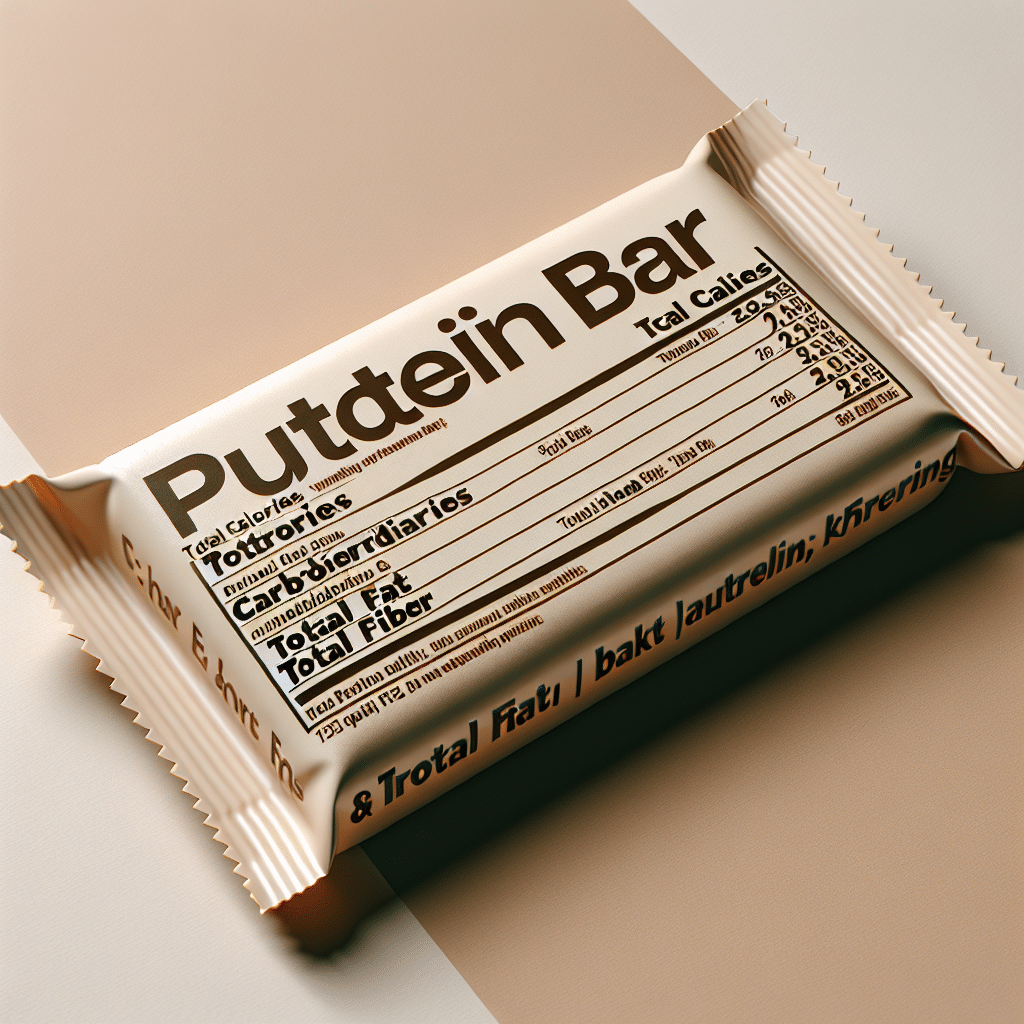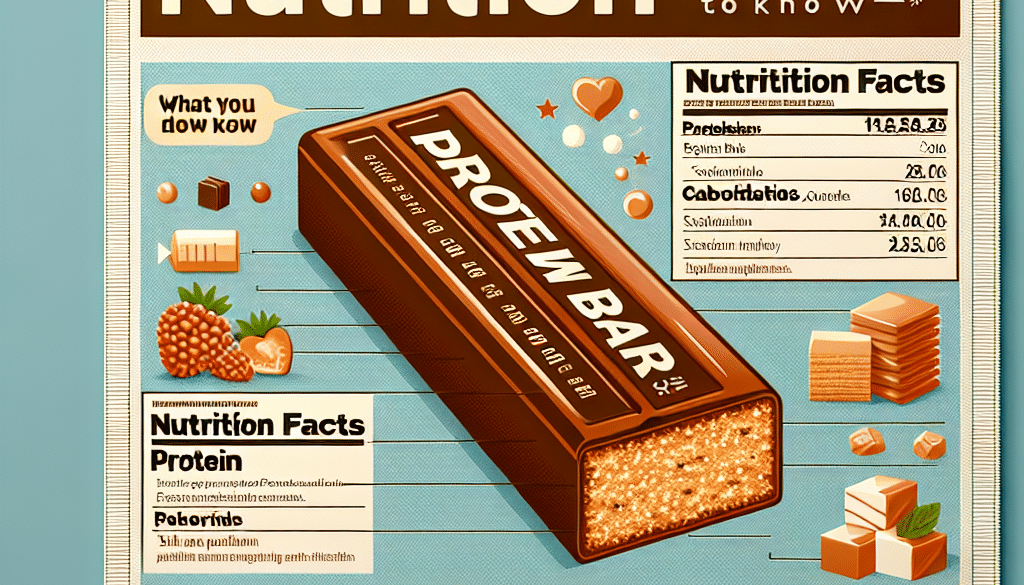Protein Bar Nutrition Facts: What You Need to Know
-
Table of Contents
- Protein Bar Nutrition Facts: Essential Insights for Health-Conscious Consumers
- Understanding Protein Bar Ingredients
- Macronutrient Breakdown
- Caloric Content and Serving Size
- Sugar and Sweeteners
- Fiber Content
- Added Vitamins and Minerals
- Special Dietary Considerations
- Case Studies and Statistics
- Choosing the Right Protein Bar
- Conclusion: Key Takeaways for Protein Bar Nutrition
- Discover ETprotein’s High-Quality Protein Products
Protein Bar Nutrition Facts: Essential Insights for Health-Conscious Consumers

Protein bars have become a staple in the diets of many health-conscious individuals, athletes, and those simply looking for a convenient snack. They are marketed as a nutritious option that can help with weight management, muscle building, and satiety. However, not all protein bars are created equal, and understanding their nutrition facts is crucial for making informed choices. In this article, we delve into what you need to know about protein bar nutrition, backed by research and statistics.
Understanding Protein Bar Ingredients
Protein bars can vary significantly in their composition. Here are some common ingredients you might find:
- Protein sources: whey, casein, soy, pea, rice, or hemp protein
- Carbohydrates: sugars, sugar alcohols, fiber, whole grains
- Fats: nuts, seeds, oils
- Additives: vitamins, minerals, flavorings, preservatives
It’s important to look beyond the marketing and examine the ingredient list to determine the quality of a protein bar.
Macronutrient Breakdown
The macronutrient profile of a protein bar is a key factor in its nutritional value. Here’s what to consider:
- Protein: The star nutrient, protein content can range from 10 to 30 grams per bar. High-quality protein is essential for muscle repair and growth.
- Carbohydrates: Carbs are necessary for energy, but the type and amount matter. Look for bars with complex carbs and fiber for sustained energy.
- Fats: Healthy fats are beneficial for satiety and hormone production. However, trans fats should be avoided.
Balance is key, and the ideal macronutrient ratio depends on your individual health goals.
Caloric Content and Serving Size
Calories in protein bars can range from 150 to 400 per serving. It’s essential to consider the serving size and how it fits into your daily caloric needs. A bar used as a meal replacement will have different caloric requirements than one intended for a post-workout snack.
Sugar and Sweeteners
Many protein bars are high in sugar or use artificial sweeteners. Excessive sugar intake can lead to health issues, while artificial sweeteners may cause digestive discomfort for some individuals. It’s important to find a balance and choose bars with natural sweeteners or low sugar content.
Fiber Content
Fiber is an important component of protein bars, aiding in digestion and providing a feeling of fullness. The recommended daily intake of fiber is 25 grams for women and 38 grams for men. Some protein bars can contain up to 15 grams of fiber, contributing significantly to daily intake.
Added Vitamins and Minerals
Many protein bars are fortified with vitamins and minerals to enhance their nutritional profile. While this can be beneficial, it’s important to ensure you’re not exceeding the recommended daily intake of these nutrients, especially if you’re also taking supplements.
Special Dietary Considerations
For those with dietary restrictions, there are protein bars that cater to specific needs:
- Gluten-free
- Vegan or vegetarian
- Non-GMO
- Organic ingredients
- No artificial additives
Always check labels to ensure the protein bar meets your dietary requirements.
Case Studies and Statistics
Research has shown that consuming protein bars can have various benefits. For example, a study published in the “Journal of the International Society of Sports Nutrition” found that consuming a protein bar after resistance training improved muscle recovery and growth. Additionally, market research indicates that the global protein bar market is expected to grow, reflecting their increasing popularity.
Choosing the Right Protein Bar
When selecting a protein bar, consider the following:
- Your dietary goals and needs
- The macronutrient profile and ingredient quality
- Sugar content and type of sweeteners used
- Caloric content and how it fits into your daily intake
- Any dietary restrictions or preferences
By taking these factors into account, you can choose a protein bar that supports your health and fitness goals.
Conclusion: Key Takeaways for Protein Bar Nutrition
Protein bars can be a convenient and nutritious option for many people, but it’s important to be discerning. High-quality protein, balanced macronutrients, low sugar content, and consideration of dietary restrictions are all crucial factors. By understanding protein bar nutrition facts, you can make choices that align with your health objectives.
Discover ETprotein’s High-Quality Protein Products
If you’re looking for premium protein options, consider ETprotein’s range of organic and plant-based proteins. Their products are non-GMO, allergen-free, and cater to a variety of dietary needs. Whether you’re a manufacturer or consumer, ETprotein offers protein solutions that are both nutritious and delicious.
About ETprotein:
ETprotein, a reputable protein Chinese factory manufacturer and supplier, is renowned for producing, stocking, exporting, and delivering the highest quality organic bulk vegan protein and plant proteins. They include Organic rice protein, clear rice protein, pea protein, clear pea protein, pumpkin seed protein, sunflower seed protein, mung bean protein, peanut protein etc. Their offerings, characterized by a neutral taste, non-GMO, allergen-free attributes, cater to a diverse range of industries. They serve nutraceutical, pharmaceutical, cosmeceutical, veterinary, as well as food and beverage finished product distributors, traders, and manufacturers across Europe, USA, Canada, Australia, Thailand, Japan, Korea, Brazil, and Chile, among others.
ETprotein specialization includes exporting and delivering tailor-made protein powder and finished nutritional supplements. Their extensive product range covers sectors like Food and Beverage, Sports Nutrition, Weight Management, Dietary Supplements, Health and Wellness Products, and Infant Formula, ensuring comprehensive solutions to meet all your protein needs.
As a trusted company by leading global food and beverage brands and Fortune 500 companies, ETprotein reinforces China’s reputation in the global arena. For more information or to sample their products, please contact them and email sales(at)ETprotein.com today.












